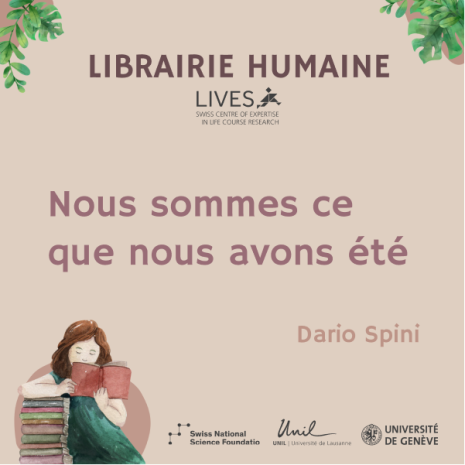By Dario Spini
Dario Spini is a social psychologist at the University of Lausanne and the initiator and director of the LIVES Centre until the end of 2022.
His story deals with the problems of elderly people in nursing homes.
How to accompany them in this last stage of life?
Dario supervised Aurélie Chopard-dit-Jean's research which inspired this story.
This story is told in French.
We go to the French Jura region, to a nursing home for the elderly, called EPHAD in France or EMS in Switzerland.
There is a 92 year old man, Pierre.
Pierre arrived a few months ago in the EPHAD. He has all his wits about him, but suffers from Parkinson's disease. Pierre is sometimes angry, sad, sullen. He sees himself as very "degraded", with a negative image of himself. The carers fear that a state of depression is setting in, especially as he has already expressed once that he would rather die than continue declining and being useless. He refuses to take part in the numerous communal activities: singing and dancing, board games, group walks, and Sunday mass. The EPHAD has a good reputation in the region.
Pierre is not like his neighbour, who spends hours looking out of his window at the nearby orchard and the birds flying from one tree to another. He knows how to be satisfied with the little he has left and is always in a good mood. But for Pierre, nothing seems to work, the staff don't know what to do.
A psychologist goes to see Pierre. Pierre tells her that he is bored and doesn't feel useful anymore, but refuses any suggestion to confide in the nurses and makes it clear that he is not interested in doing activities with the other "old fogies", as he calls them. He stays in his room, watches TV, walks in the garden. Talks little to the other residents. He receives regular visits from his 4 children, 11 grandchildren and 7 great-grandchildren. We cannot say that he is isolated, even if he misses his wife who died about ten years ago.
The team of professionals and carers is distraught, thinking that on the one hand Pierre is not isolated, that he still has a large family. He should make more effort and if this doesn't change, they'll talk to the doctor to see if he should be prescribed anti-depressants. How to get out of this situation?
Pierre is the eldest son of three children from a farming family. Pierre as the eldest, as was the tradition, took over the farm and raised cattle and cultivated cereals. It was there that he and his wife had four children. But farming is not his passion. In fact, his dream is to cook. So he decided to train as a chef while keeping the land and some cows. The years of farming have enabled him to earn a good living and he has no worries about supporting his family. His brother helps out when he can. His wife also helps out. After his training, he started as a caterer and served large tubs, often working 12-hour days. He was then hired to look after the refectory at the Peugeot factory, where he earned a good living and could finally enjoy free Saturdays and Sundays. He sold the animals, but kept the land and the farm, renting the land to other farmers, which brought him good money in addition to his salary.
Later on, his eldest son took over the farm out of passion, reproducing the family tradition. Pierre then tells of the pleasure he had in planning the menus for the factory workers and executives, making sure to offer them menus that delighted them every day. For him, cooking was a passion that he could exercise every day for the benefit of thousands of employees who tasted his dishes and menus.
When the children grew up and he had saved a lot of money for the time, Pierre wanted to travel. His second passion. He had already travelled around Europe with his family, but his wife didn't want to fly, so he didn't have the opportunity to make long trips and he dreamed of going to the USA. Early in his retirement he made two trips there, one to New York and one to the West with friends. He describes these trips as wonderful. Cooking was his life and the trips to the USA were the icing on the cake.
Pierre takes pride in his identity as a cook, in what he has been able to achieve through his technique, his taste for things well done and his creativity. Luckily, he tells this life story to a researcher who is interviewing people in this EPHAD. The researcher realised that the Pierre she had seen was not the Pierre she had been told. On the basis of these interviews, she gave back what she had learned to the animation team by asking them to think about what could rekindle the flame of passion that she had seen in Pierre's eyes when he spoke about his life as a cook.
Does his life journey, which is also a journey of identity, give you solutions to change Pierre's situation in his home for the elderly?
Today, Pierre has a new role in the EPHAD. Of course he can no longer cook. The team introduced him to the cook in charge of the EPHAD's restaurant and every week one of the meals is designed by Pierre. Every Thursday evening we now have "Pierre's menu". He has now become friends with the cook in charge of the refectory who shows him new cooking techniques and Pierre in exchange shares his experiences with him. In order to find new ideas, he has also accepted to learn about computers and can now surf the web. This new function, which is certainly limited but visible and in line with his life course, has transformed Pierre who has found his place in the EPHAD and now feels valued and useful.
Our life courses are different and we are what we have been. So sometimes it is enough not to ask the most vulnerable to adapt, but to ask institutions and professionals to adapt to the most vulnerable. This is how the meaning of life can be renewed and enable us to live better, even in old age.



